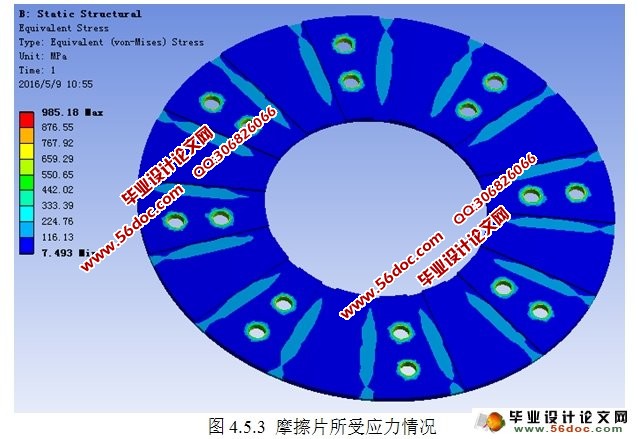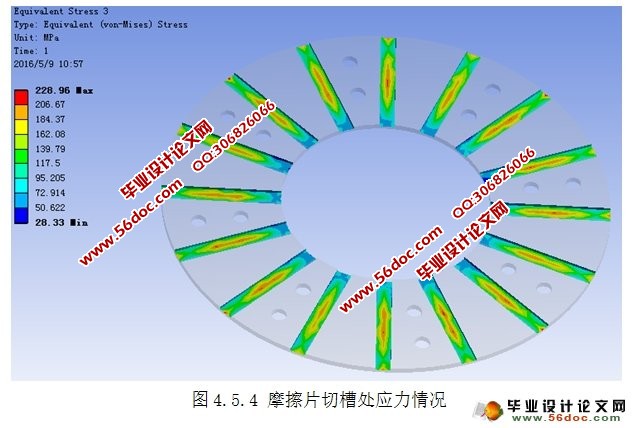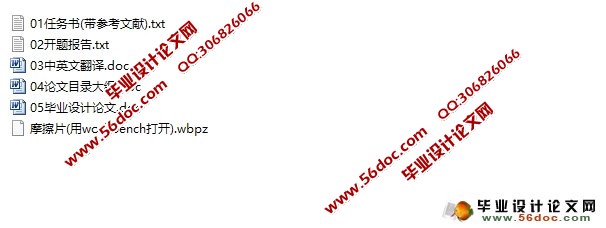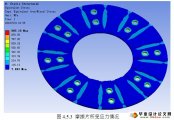汽车离合器摩擦片的有限元分析(ANSYS)
来源:wenku7.com 资料编号:WK713059 资料等级:★★★★★ %E8%B5%84%E6%96%99%E7%BC%96%E5%8F%B7%EF%BC%9AWK713059
以下是资料介绍,如需要完整的请充值下载。
1.无需注册登录,支付后按照提示操作即可获取该资料.
2.资料以网页介绍的为准,下载后不会有水印.资料仅供学习参考之用. 密 保 惠 帮助
资料介绍
汽车离合器摩擦片的有限元分析(ANSYS)(任务书,开题报告,外文翻译,论文说明书11900字)
摘 要
离合器在汽车传动系统中起到至关重要的作用,而摩擦片又是离合器相关零件中的重要组成部分之一。摩擦片性能的好坏对离合器的使用有非常重大的影响。本文的目的是通过有限元技术软件ANSYS对离合器摩擦片建立模型, 进行离合器摩擦片的热-应力耦合分析。根据分析结果得到热载荷下摩擦片的温度分布以及应力分布情况,并且以此为基础,分析和提出能够提高离合器工作性能的建议。经过本次实验分析可以发现,研究得到的结果对离合器的使用有一定的参考意义。
关键词:离合器;摩擦片;温度场;热应力
Finite element analysis of friction plate of automobile clutch
Abstract
The clutch plays an important role in the automobile transmission system. And friction plate is one of the important parts of the clutch as well. The performance of the friction plate has a great influence on the use of the clutch. The purpose of this paper is to establish the model of clutch friction plate by the finite element software ANSYS, to complete a thermal stress coupling analysis of clutch friction plate. According to the analysis results, the temperature distribution and stress distribution of the friction plate under thermal load are obtained. And based on this, some suggestions on improving the working performance of the clutch are analyzed and put forward. Through this experimental analysis, we can find that the results of the study have a certain reference value for the use of the clutch.
Key words: Clutch; Friction plate; Temperature field; Thermal stress
摩擦片模型建立
离合器摩擦片绝大部分都是以石棉为主材料而加工形成的,它的外形呈现为环形圆盘。要想较为准确的分析这种零部件,我们可以使用有限元软件来进行研究。
要想使得整个研究过程能够顺利的进行,实验前的准备工作就显得至关重要。该过程主要包括几何建模、定义材料的属性和实常数、定义单元类型、网格划分、添加约束与载荷等。因为摩擦片的分析中难点较多,问题比较复杂,所以我们使用ANSYS中的Workbench对摩擦片进行建模与处理。
本论文根据某已有摩擦片的属性参数进行了研究分析。所研究的摩擦片是由石棉为主材料构成的,它的材料参数如下:
热传导系数:10W/m•k;
比热容:175J/(kg•℃);
热膨胀系数:1.1×10-5 1/k;
密度:1100kg/m3;
弹性模量:2.76×1011Pa;
摩擦片外径:0.3m;
摩擦片内径:0.14m;
摩擦片厚度:0.004m。



目 录
摘 要 II
Abstract III
1 绪 论 1
1.1 离合器的功用 1
1.2 离合器的分类 1
1.3 离合器的原理 4
1.4 离合器的发展史 5
2 离合器摩擦片分析基础 7
2.1 摩擦片概述 7
2.2 滑摩功率的分析 7
2.3 热流密度的分析 8
3 摩擦片模型建立 9
4 摩擦片的有限元分析 13
4.1 热结构耦合方法 13
4.2 网格划分 14
4.3 施加载荷 15
4.4 温度场分析 17
4.5 应力场分析 18
4.6 本章总结 21
5 总 结 22
参考文献 23
致 谢 24
|







